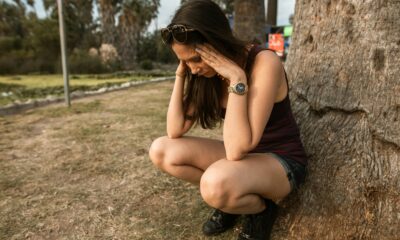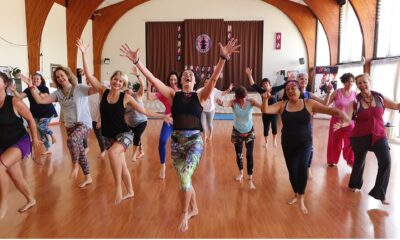
OpEds

Save our psyche: the benefits of physical activity on mental health
We are living through one of the most traumatic times in which uncertainty reigns supreme, but we tend to focus on the physical consequences and forget the devastating impact on our mental health. However, positive strides are being made to prioritise mental health.
Our sporting heroes are human too. There has been an increase in the prevalence of mental-health concerns amongst elite athletes, as seen recently with Olympic gymnast Simone Biles, international cricketer Ben Stokes, and professional tennis player Naomi Osaka. There should be no shame about protecting one’s mental health.
We are focusing on the negative in what we are reading, watching, and discussing. These negative triggers can cause repeated mental stressors, leaving us in a vicious cycle of mental trauma.
In Cape Town, we are blessed with the wonders of mountains, oceans, nature reserves, and urban parks. One beautiful thing I’ve noticed since lockdown is that more people are getting physically active outdoors. The parking lots of our favourite outdoor activities are packed on weekends. It’s probably the only time I don’t get annoyed when I struggle to find a parking!
Increased physical activity has had excellent results in treating anxiety and the various anxiety related disorders (posttraumatic stress disorder, generalised anxiety disorder, and obsessive-compulsive disorder among them). There are now well-described links between physical activity and enhanced mental health and well-being.
The Royal College of Psychiatrists in the United Kingdom (UK) now recognises exercise prescription as a formal treatment modality for a wide-range of mental conditions. Added to that, the American College of Sports Medicine piloted a programme called “Exercise is Medicine” which highlights the benefits of being more physically active and conceptualises the idea of using physical activity as a treatment. It has had promising outcomes.
However, there’s still a stigma surrounding mental illness which can prevent people from acknowledging the benefit that participating in exercise can have on their mental well-being. The term “well-being”, according to the UK government, is defined as a positivephysical, social, and mental state. This highlights the importance of healthcare professionals having a holistic approach to care. Mental well-being is further described as an individual’s ability to develop their potential, work creatively and productively, build strong relationships, and contribute to their community. Physical activity has the benefit of being available to all, is low cost, and provides an empowering approach to self-management.
We know that exercise and physical activity is beneficial, but it’s important to know the science behind it.
Physical activity improves our psyche by:
- Increasing self-esteem;
- Reducing stress and anxiety;
- Assisting in reducing social anxiety;
- Improving quality of life;
- Enhancing sleep;
- Resulting in fewer symptoms of and treatment for depression – evidence shows a 20% to 30% reduction in depression in adults who participate in daily physical activity;
- Improving cognitive function following aerobic activity (jogging, swimming, cycling, walking, gardening, and dancing);
- Reducing cognitive decline – evidence shows a 20% to 30% risk reduction in developing dementia with daily physical activity. Furthermore, it seems to reduce the likelihood of experiencing cognitive decline in people with dementia.
The cause of these improvements is proposed to be increased blood circulation to the brain under the stress of physical activity and the influence of circulating hormones (the HPA axis – hypothalamic-pituitary-adrenal axis). Additionally, these systems interact with areas of the brain including the limbic system (responsible for controlling motivation and mood), amygdala (which generates fear in response to stress), and the hippocampus (responsible for memory formation), to form the beautiful symphony of exercise physiology.
We shouldn’t forget about the effects on children. Physical activity can help increase self-esteem, reduce depression and anxiety, and improve cognitive skill acquisition. Playing outdoors can assist in relieving symptoms related to attention deficit disorder as well.
Along with the pandemic, we are faced with another challenge – “sitting disease”. Modern life has become focused on instant gratification and convenience. We tend to sit more and have become sedentary.
Since the pandemic, there has been an increase in social anxiety secondary to the lockdown laws and forced social distancing. Although social anxiety is prevalent, people seem to be more willing to socialise outdoors. This allows them to interact and be physically active in a safe way. One thing I like to focus on is that any bit of physical activity can be beneficial. I find that telling people to exercise is often met with apprehension. People are unsure where to start or what type of training to do. I rather believe that we should focus on being more physically active – walk to the shops, clean the house with music, garden with intensity, and dance when we want to.
Finally, I’m regularly asked if there’s a “wonder drug” that can help people heal quickly and slow down the progression of disease. Thankfully, physical activity has been shown to be the amazing treatment that no drug can achieve. It’s easy, can be done anywhere, and is available to everyone. You don’t need to be able to run a marathon to be healthy, any little bit counts.
Get out, have fun, ask questions, and save your psyche!
Please remember to consult your healthcare professional prior to embarking on your physical activity journey.
- Dr Daniel Tadmor is a clinical medical officer working in Cape Town and completing a Master’s degree in sport and exercise medicine. Email questions to him at tadmor.di@gmail.com.











Roma Kraitzick
August 12, 2021 at 6:10 pm
Excellent article. So proud of you.